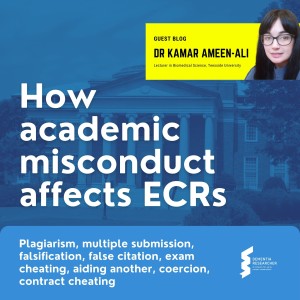
Dr Kamar Ameen-Ali narrates her blog written for Dementia Researcher.
Dementia research has been in the news again. Sadly, there is no promising new drug on the horizon, and no new breakthrough in our understanding of the brain diseases, like Alzheimer’s, which lead to dementia. Instead, we find ourselves shocked by an investigation into what has become a high-profile case of potential academic misconduct in our field. This case has been widely reported in the press, but what hasn't been discussed is how early career researchers (ECRs) are affected by academic misconduct. In this blog, Kamar discusses how the structure of academia makes ECRs particularly vulnerable to the effects of academic misconduct.
Find the original text, and narration here on our website.
https://www.dementiaresearcher.nihr.ac.uk/guest-blog-how-academic-misconduct-affects-ecrs/
--
Dr Kamar Ameen-Ali is a Lecturer in Biomedical Science at Teesside University & Affiliate Researcher at Glasgow University. In addition to teaching, Kamar is exploring how neuroinflammation following traumatic brain injury contributes to the progression of neurodegenerative diseases that lead to dementia. Having first pursued a career as an NHS Psychologist, Kamar went back to University in Durham to look at rodent behavioural tasks to completed her PhD, and then worked as a regional Programme Manager for NC3Rs.
--
Enjoy listening? We're always looking for new bloggers, drop us a line. http://www.dementiaresearcher.nihr.ac.uk
This podcast is brought to you in association with Alzheimer's Research UK and Alzheimer's Society, who we thank for their ongoing support.
Comments (0)
To leave or reply to comments, please download free Podbean or
No Comments
To leave or reply to comments,
please download free Podbean App.